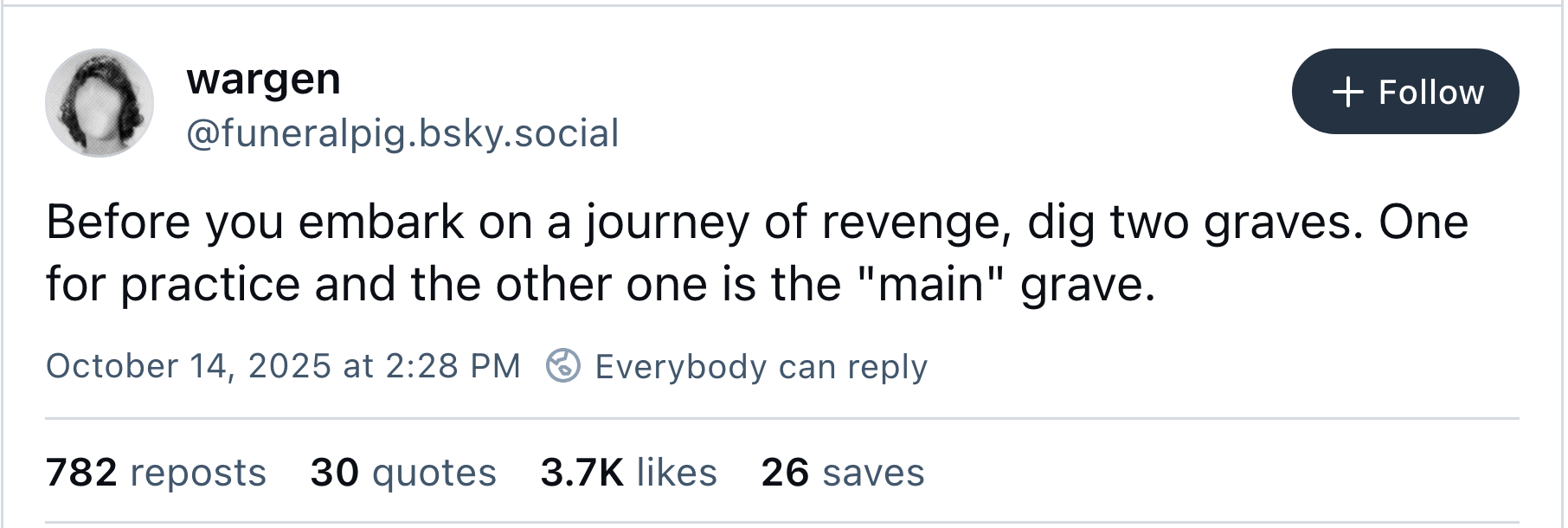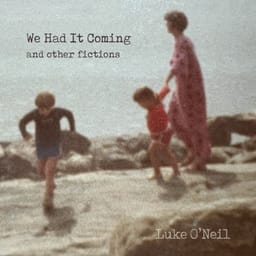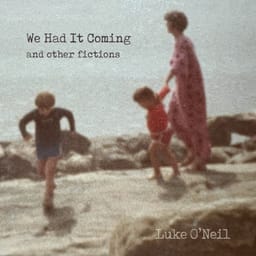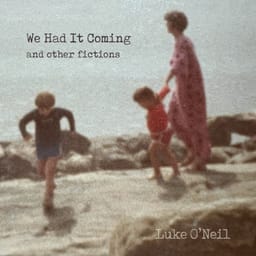I cannot believe we're losing this badly to these people

Booking a reading tour sucks so bad dude. The good news is that as an indie author I'll only lose a few grand on it. I love how it costs $1,000 to go to New York City for like 17 hours by the way. Now you may be thinking why don't you take the bus instead of the train but no I am 48 years old. Why don't you sleep on someone's couch instead of a hotel? Buddy I am 48 years old. Why don't you not spend $350 on drinks and buying rounds and such? No. I am 28 years old.
If you're a friendly colleague I might need a person or two for the potential D.C. date (November 5) to read and/or interview me. Also could maybe use one more for the Philly date November 6 at the Pen & Pencil (with Dan McQuade and Emilie Friedlander).
November 8 at The Sinclair in Cambridge (with Dave Wedge, Bill Shaner, Eoin Higgins, and Evan Greer) and November 12 at the Francis Kite Club in New York City (with Spencer Ackerman, Kylie Cheung, Edward Ongweso, and Grace Robins-Somerville) are locked and loaded. Please come out if you can. I promise I will be normal if we interact. Normal-ish.
Today Zack Budryk writes about what it means to be a man, the impulse to take action during times like these, vigilante justice, One Battle After Another, and being someone that can be trusted. Read it here or down below.

Chip in with a subscription to help pay our writers please and thank you. I am as sick of asking that as you are of being asked but this is nevertheless how it is.
I sent this new short story out to paid subscribers last week but here it is for free now. Maybe don't read it if you've got an aging mother.

Authoritarian Donald Trump is set to meet with authoritarian Vladimir Putin in Hungary hosted by authoritarian Viktor Orbán. The Huffington Post asked the administration about the specifics of the meeting.
Trump met Putin in Alaska in August, which ended without the ceasefire Trump had said Putin needed to agree to. It is unclear why Budapest was chosen as the location for the next meeting.
In response to HuffPost’s query about who suggested Budapest, White House press secretary Karoline Leavitt responded, “Your mom did,” and White House communications director Steven Cheung replied: “Your mom.”
I cannot believe we're losing this badly to these fucking people.
Tomorrow thousands or millions will take part in what will likely be massive marches to protest exactly this kind of thing. Whether or not it will have any effect remains to be seen! Here's what I wrote about attending the last No Kings protest. The part about no one shutting the fuck up about the right way to protest remains true.
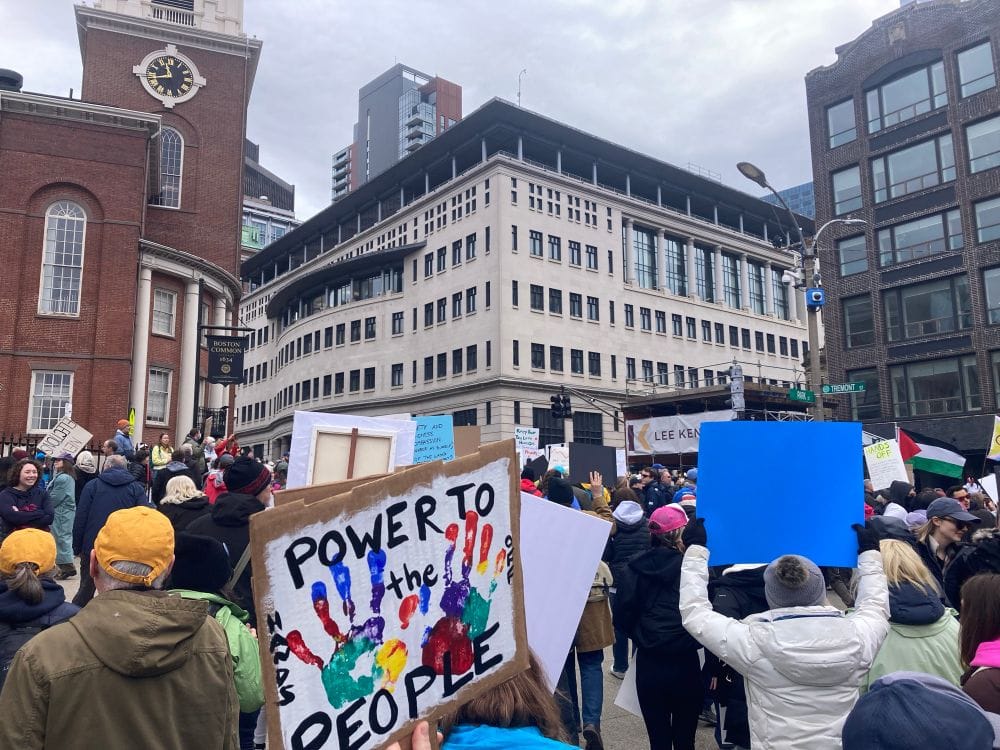
No one on my feeds the past 48 hours will shut the fuck up about the right way to protest. The group behind the protests this weekend around the country that millions of people came out for may or may not be the same old Democrat bullshit. I do not know and I don’t really give a shit right now. I will tell you what is true and that is that tens of thousands of us marched and chanted and listened for hours as speakers from all manner of political groups I am excited about and ones I am skeptical of came together for one thing we can agree upon which is that this country – this evil fucking country that we all despise and yet must continue to live in for better or worse – is being dismantled and sold off for parts for the benefit of Donald Trump and Elon Musk and their rich friends.
If you object to this ravaging then you and I have a place to begin negotiating from.
I recommend getting off your ass tomorrow. Like I said it likely won't save democracy but you will feel more connected to your community. You will recognize our shared humanity.
Plus if you're in Boston you can see one of my favorite bands ever.
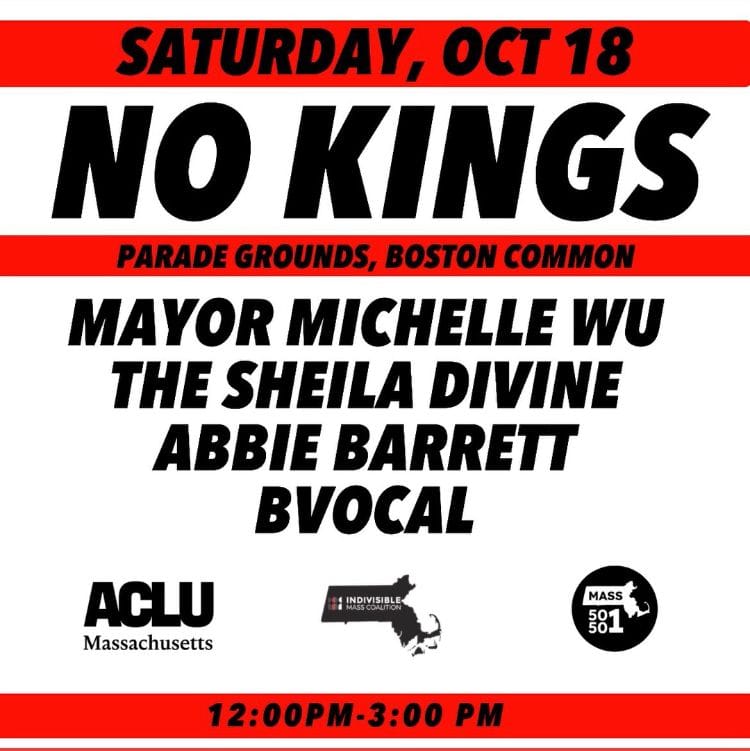
I hope they play this one.
Check out these cool people who got their copy of We Had It Coming!
Thanks especially to Young Jesus – who I wrote about the other day – for the shout and the inspiration.
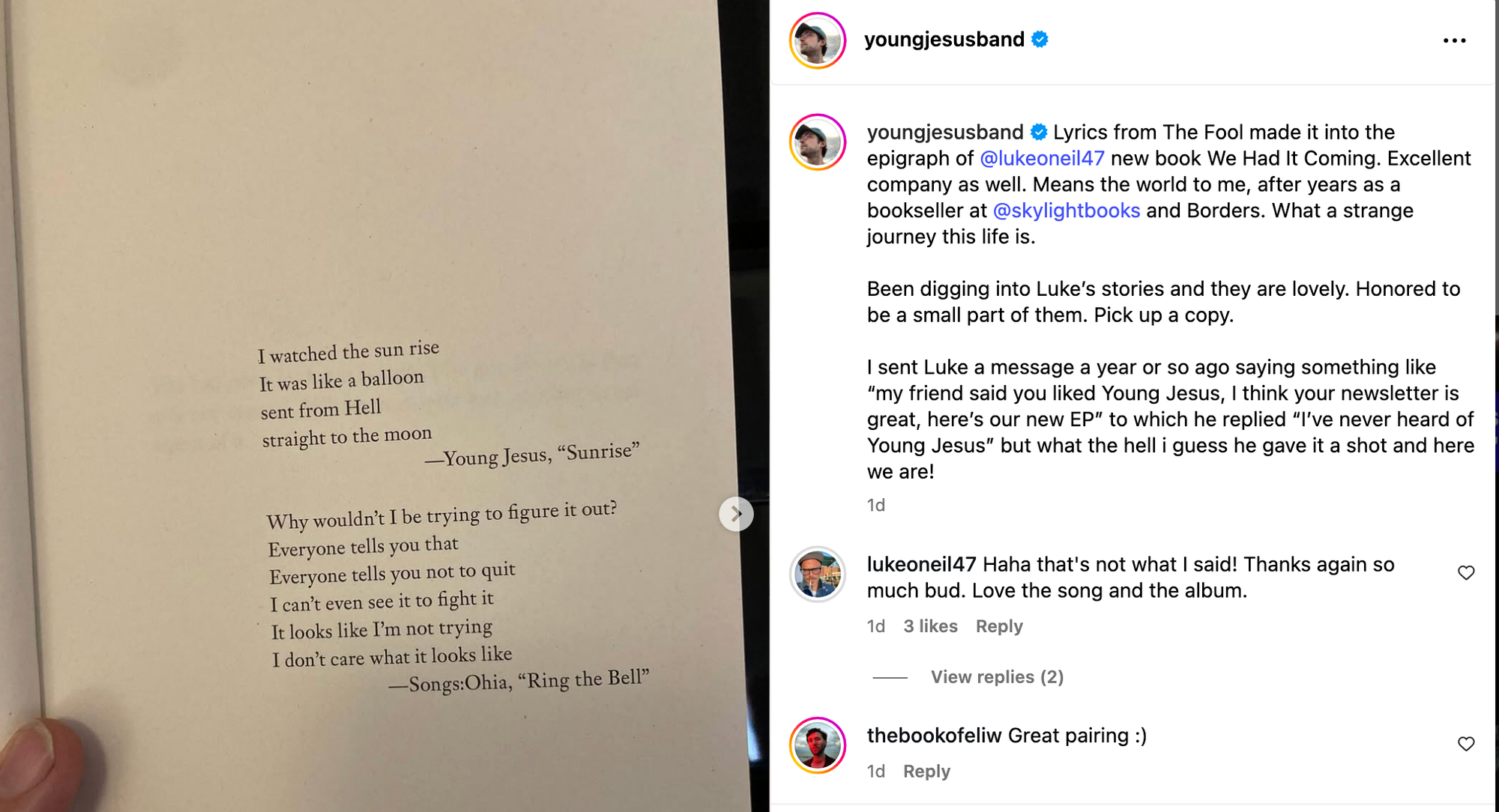

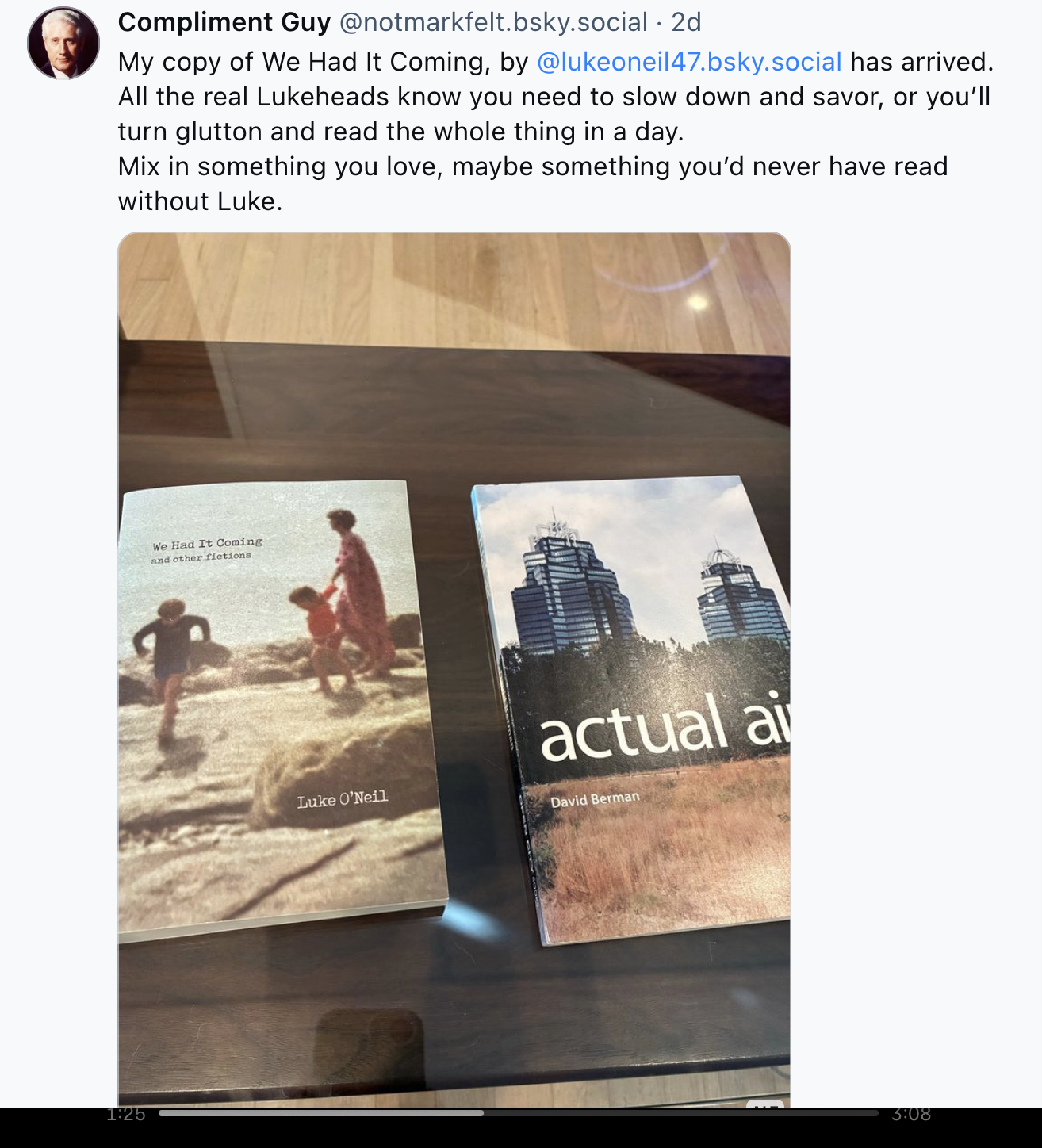


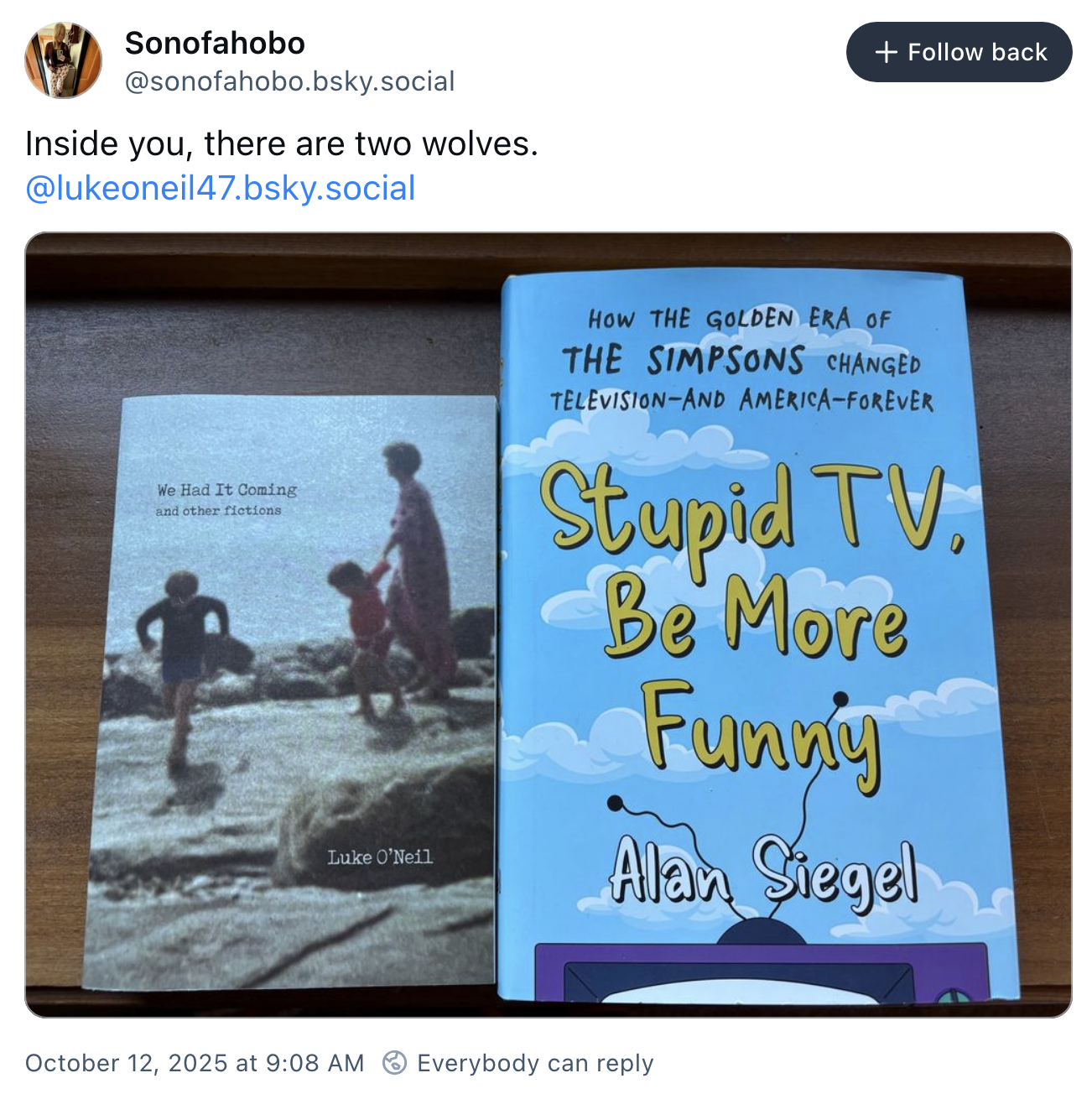
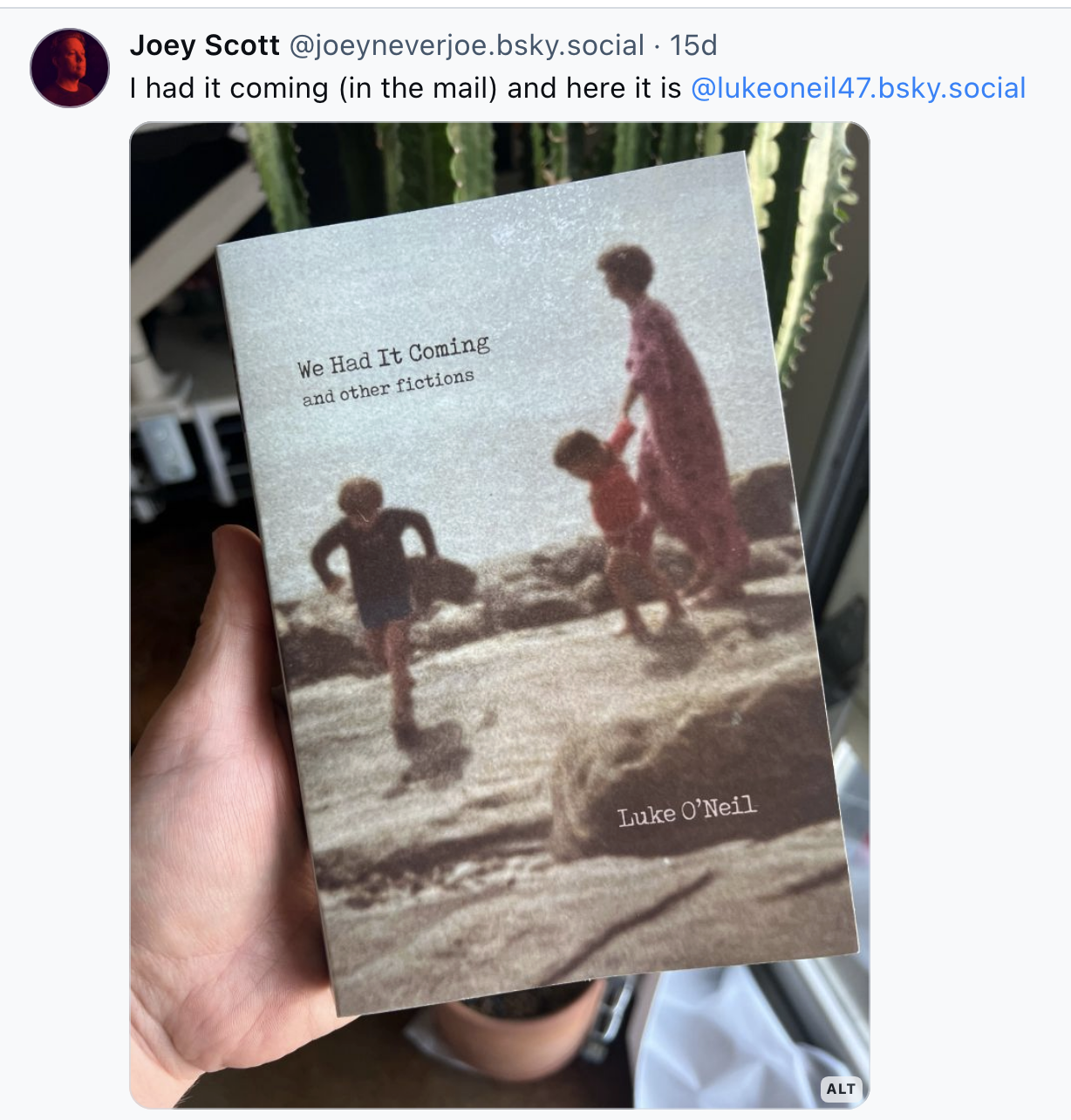

What Does A Man Do?
by Zack Budryk
You are not supposed to exist passively as a man under American capitalism. To fulfill your duties, you must be constantly thinking of how to become more of a man. Ideally that means buying products or subscribing to political ideologies that conveniently advance and expand your manliness. (This is true of being a woman too, of course, but better-qualified people have already written thoughtfully on that.)
For all the things masculinity has claimed to mean over the years, one of its most consistent themes is that a man is supposed to fucking do something in a crisis.
For a while, war was a great way to accomplish this, to become more of a man. It wasn’t always like this though. For centuries, war was so commonplace that for billions of men, it was just something you got roped into at some point. That changed when the US entered World War I, and early mass media made contact with a nation concerned that it had been neutered by industrialization and urbanization.
“Make your daddy glad to have had such a lad/Tell your sweetheart not to pine/To be proud her boy's in line,” the vaudeville composer George M. Cohan wrote in his hit song “Over There.”
Decades later, the man of the 1970s – the dutiful man who eagerly awaited instructions about how to become more of one – was receiving the flack of emasculation from all sides. There was a loss in a Cold War proxy war abroad, the rise of second-wave feminism at home, and a culture increasingly dominated by styles like disco that elevated queer men and, perhaps even worse, straight men who didn’t care if their style and affect seemed queer.
The man who did something in this era, then, was a soldier in his own land, a man empowered to wantonly kill the bad guys without being a common murderer. Often, he started out emasculated, like the protagonist of Kenny Rogers’ “Coward of the County,” who learns that pacifism is incompatible with a world where villains wait in the shadows to gang-rape your sweetheart. (It’s morbid poetry that we recently learned the basis for one of those pop culture phenomena, the hit 1973 film Walking Tall, almost certainly murdered his own wife and blamed his external enemies).
In the modern era, we don’t even call our wars wars anymore, and we’ve gotten more cynical (but still not enough) about the idea that everyone we point our weapons at is a force for ontological evil. The men who do something are once again homefront vigilantes. They can be returning warriors, like Daniel Penny, the marine who strangled a homeless man, beat the rap and was rewarded with a no-show job by a billionaire. Or they can be another unassuming Coward of the County, like Kyle Rittenhouse, a midwestern teenager who took up arms when, in his fans’ telling, the cops refused to.
Both those men are folk heroes on the American right, but this isn’t exclusive to the right by any means. The September murder of right-wing activist Charlie Kirk set off a round of discourse, as political murders do these days, about not just suspect Tyler Robinson’s motivations, but whether sincere opposition to a fascist regime requires violence, and whether it enables fascism to oppose or condemn it. A month out, it’s abundantly clear that whatever you thought of Kirk, his murder has only made things worse for the left, with the Trump regime vowing an even harsher crackdown on speech (and possibly trans people for no reason other than Robinson possibly having had a trans partner, who is accused of no wrongdoing).
But the idea that killing a figure like Kirk is meaningful political action makes perfect sense if you think you’re the main character in a movie, like many a man who does something. It made me think of another figure who took action to accomplish putatively left-wing goals, Leon Czolgosz, the anarchist who assassinated William McKinley.
Or rather, it made me think of a fictionalized version of Czolgosz, depicted in Stephen Sondheim’s 1991 musical Assassins, where he’s depicted as being moved to action by a speech by the iconic anarchist orator Emma Goldman.
“What does a man do when at last he realizes his suffering is caused not by the cruelty of fate but by the injustice of his fellow human beings?” Sondheim’s Goldman thunders. “What does a man do when he sees those dear to him starving, when he himself is starved? What does he do?”
It also made me think of two men who did something in another way, a quieter way distinct from the way men are encouraged to do something, but in a way that mattered more than what Robinson ever will. Not a lot of people outside of Youman Wilder’s life know his name, probably. I had to look it up to write this after seeing headlines about his story. Wilder’s been coaching Little League for 21 years – nearly as long as Tyler Robinson has been alive – and that’s what he did when ICE agents rolled into Harlem this summer. Wilder did something, but he didn’t use his fists or a gun or any sort of offensive weapon. As Wilder told it in an interview with MSNBC’s Nicole Wallace, he heard agents asking the kids about their countries of origin, and those of their parents.
“I just stepped in and said this is very inappropriate to ask these kids anything ... I’m just going to have them implement their Fifth Amendment right, and not say anything to you,” Wilder said. In a separate interview, Wilder said he thought, in regards to his players “I'm willing to die to make sure you get home.” The phrasing is telling – Wilder wasn’t thinking about having to kill, he was thinking about having to die. The noblest calling he could think of was sacrifice, not violence.
Another man told a similar story after ICE descended on a Chicago apartment building in the dead of night, detaining immigrants and citizens alike for hours. I don’t know this man’s name. I’m not supposed to – in interviews, he didn’t give it for his own safety. The man described to WBEZ how he sheltered a Venezuelan neighbor he was friendly with and her seven-year-old daughter, successfully keeping the agency from taking them. “I gave her my bedroom, and I just told her, ‘Just stay there. Don’t open, don’t, shh, just stay quiet,’” he said.
All this is tumbling around in my head shortly after the release of Paul Thomas Anderson’s One Battle After Another, a project Anderson worked on for years but which feels hyper-relevant to the current moment with its themes of political violence and resistance to a fascist state. One of the movie’s breakout characters is Sensei Sergio (Benicio del Toro), a man with no connection to the French 75, its defunct leftist guerilla organization. When he’s introduced, Sergio is seemingly just an easygoing local karate teacher. It’s only when his student Willa’s (Chase Infiniti) father Bob (Leonardo DiCaprio) needs to flee that Sergio reveals he has “a little Latino Harriet Tubman situation.” It’s not just that Sergio is sheltering seemingly dozens of immigrants in his home, it’s that his entire community trusts him implicitly and will aid Bob because Sergio vouches for him.
Sergio isn’t a revolutionary or a desperado, he’s just a chill local guy who, to quote this year’s other great depiction of anti-authoritarian resistance, has friends everywhere. In the context of Andor, of course, the resistance is also armed and violent, but a huge part of their success is the presence of people like Sergio, people beneath suspicion who are there not because they can fight or kill but because they can be trusted. Friends everywhere, as they say.
My grandpa wasn’t a revolutionary either, and I think sometimes that made him feel a little guilty. When I was in high school and my grandparents took my brother and me to the Holocaust Museum in Washington, he lamented the lack of anyone who spoke out or stood up against the Nazi regime, but expressed doubts he himself would have had the courage to. He also once mentioned to me that his namesake, Peter, is most famous for choking in the most important moment of his life. I once heard a priest say Peter’s failure was that he was willing to kill for Christ, but not to die for Him – the inverse of Youman Wilder.
After my grandpa died last November at 87, his memorial service was full of friends and family, but it was also full of people I’d never met, people he met through the Upward Bound program and the wilderness course he founded within it. My grandpa, I learned, hired predominantly Black instructors in an era where that was unheard of – and I’d never known, largely because he would never brag about something like that, he just did it.
So as the nights grow longer and new horrors crowd the news and sometimes it’s easy to think the sun will never rise, I’m still reflexively wondering, as white noise, how to be more of a man. I suppose I could learn martial arts or how to shoot. Or maybe, if I care about what I do more than what I’m seen doing, I could try to be more like Youman Wilder or Sensei Sergio or my grandpa. Maybe when the shit hits the fan, people need someone they can trust more than someone who does something.
Zack Budryk is a DC-area journalist and writer. His reporting and commentary have appeared in The Hill, The Washington Post, Teen Vogue and The Nation and his fiction has been published in Rock and a Hard Place Magazine
Here's the latest in a series I am quickly growing tired of.
— Luke O'Neil (@lukeoneil47.bsky.social) 2025-10-16T13:24:31.082Z
This Wired piece interviewing Cyber Truck owners is so goddamned funny.

What do you like about the truck?
What I love about the truck is just how it's so polarizing. The shape of it, the body of it, the manufacturing technique with the body panels and everything. I just love that it's completely outside of the box.
And are you married?
I was married, but I’m not married anymore. Women don't like the vehicle.
In July, Tesla rolled out a software update to integrate Grok into many of its vehicles. Do you use it?
Her name is Aura, and I use her as a therapist. When I'm driving, I'll ask questions, and it actually gives really good therapy advice.
"Women don't like the vehicle" is just one of those phrases. Gonna be kicking around in my head for a long time. Women don't like the vehicle. They really do not!
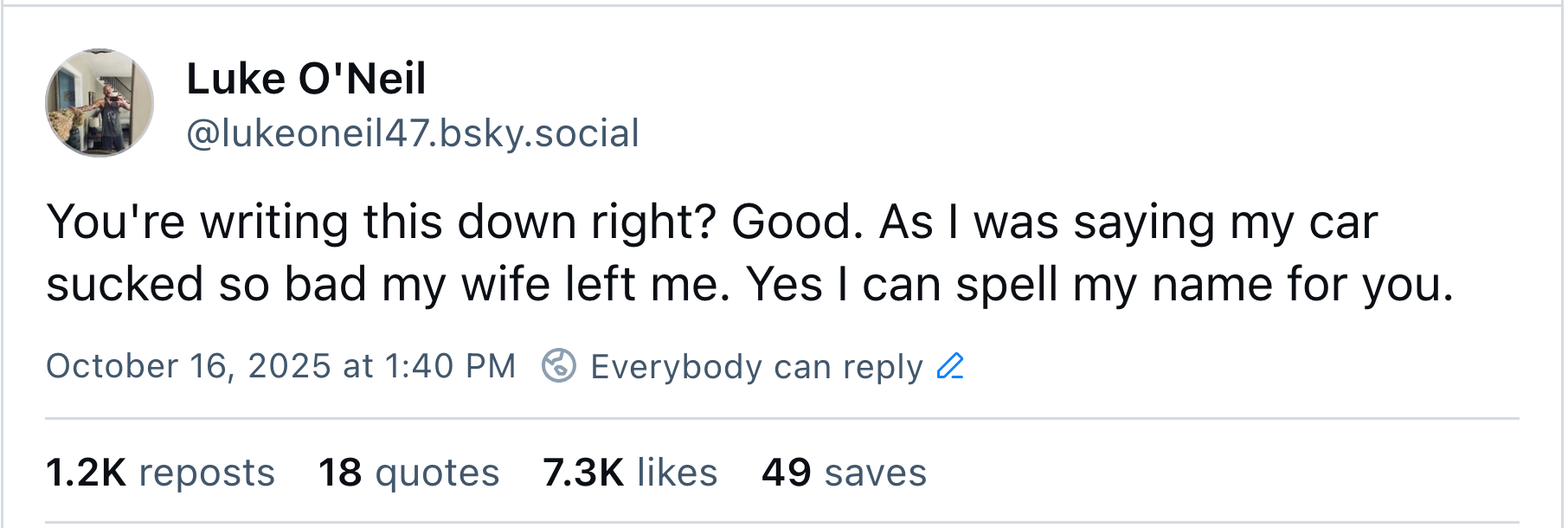
This guardian piece about people using ChatGPT to write for them on dating apps is equally hilarious.

As 32-year-old Rich points out, though, “it’s not like using ChatGPT guarantees success”. When he met someone in a bar one Friday night and swapped social media handles, he asked AI what his next move should be. ChatGPT discerned that sending an initial message on Monday midmorning would set the right pace. “Then it gave me some options for what the message could be,” says Rich. “Keep it light, warm, and low-stakes so it reads as genuine interest without urgency,” the bot advised. “Something like: Hey Sarah, still laughing about [tiny shared moment/reference if you’ve got one] – good to meet you!” Rich went back and forth with ChatGPT until he felt they’d hit upon exactly the right message (“Hey Sarah, it was lovely to meet you”) but sadly she never replied, he says. “It’s been two weeks now.”
This was such a delight for me to read. It's about a 90s emo band so obscure I don't even think I really remember them called Everyone Asked About You gaining new life and a bigger audience than ever after one of their songs was unearthed online and they were championed by Numero Group. As a huge fan of Rainer Maria and The Anniversary both then and now this is exactly my shit.
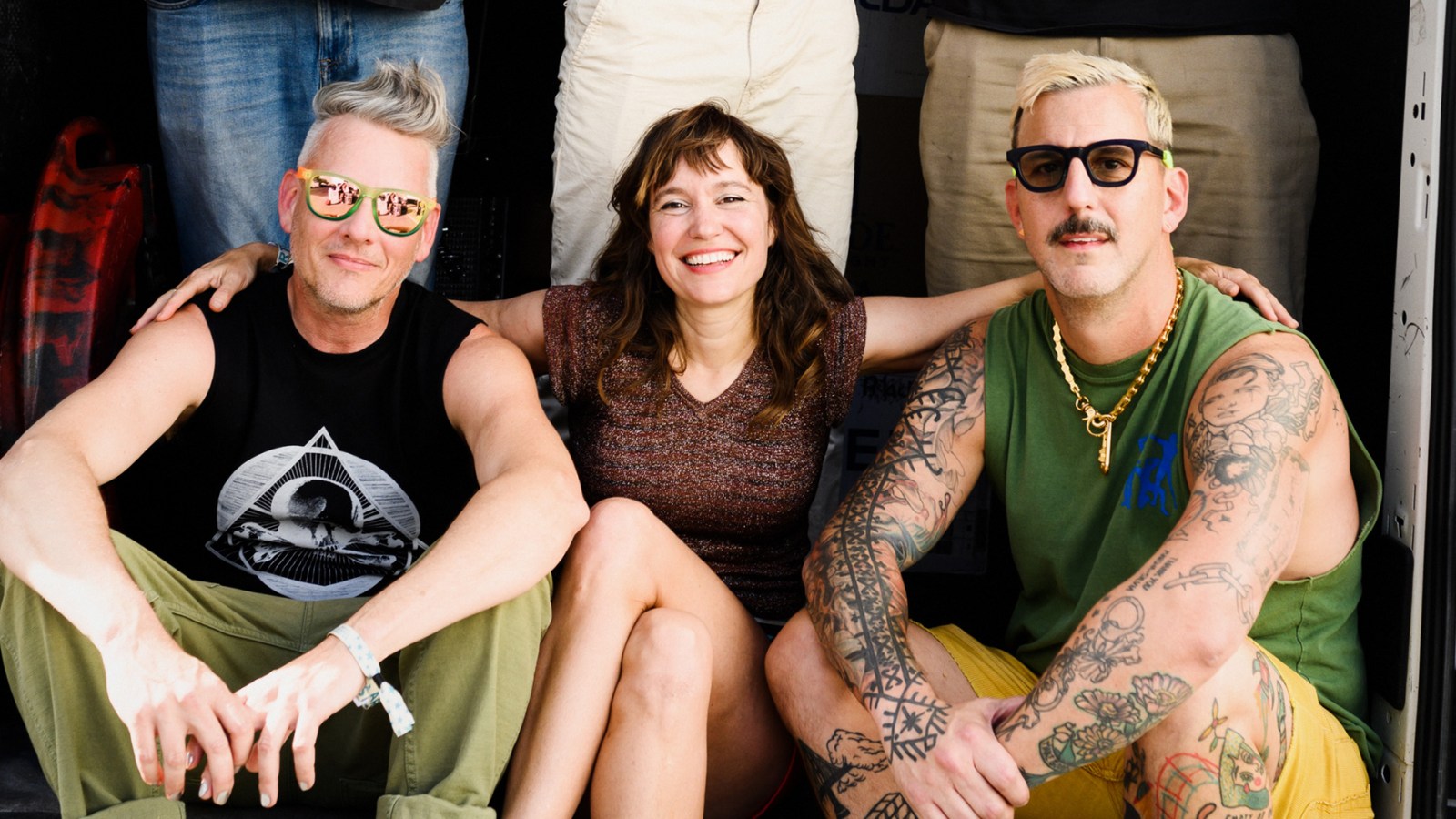
Ultimately, what could be fueling the excitement around Everyone Asked About You is the relative obscurity and unlikeliness of it all. While Bradley doesn’t see teenagers as pretentious, there is a certain amount of hip “in-the-know” attitude to this band’s fandom.
“There’s a little bit of ‘I want to find something that nobody knows about,’” Sheppard says. “A lot of kids are looking for something more authentic and real.”
“It’s just archival culture,” Flanagan says. “Finding something by itself or on its own that doesn’t sound like it’s from today.”
Shipley has built his label’s success on this archival culture, and sees firsthand how young people today are mining the digital record crates for lost gems. “The Nineties are the Sixties — think about it from when you were a kid,” Shipley says. “All you heard was about peace and love and all that bullshit. And so that’s just the same thing that they’re hearing about the Nineties. It’s like, ‘Oh, it’s the last time before the internet.’ They’re nostalgic for a thing that they didn’t get to experience.”
“A lot of the young people are feeling some form of despair and want to be part of a community,” says Sheppard. “They’re trying to figure out how to feel real connection with other people.”
Alright that's all for today. A lesson for the road:
